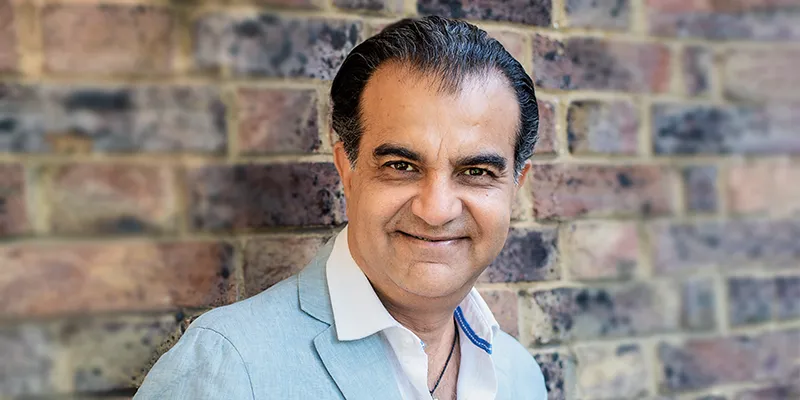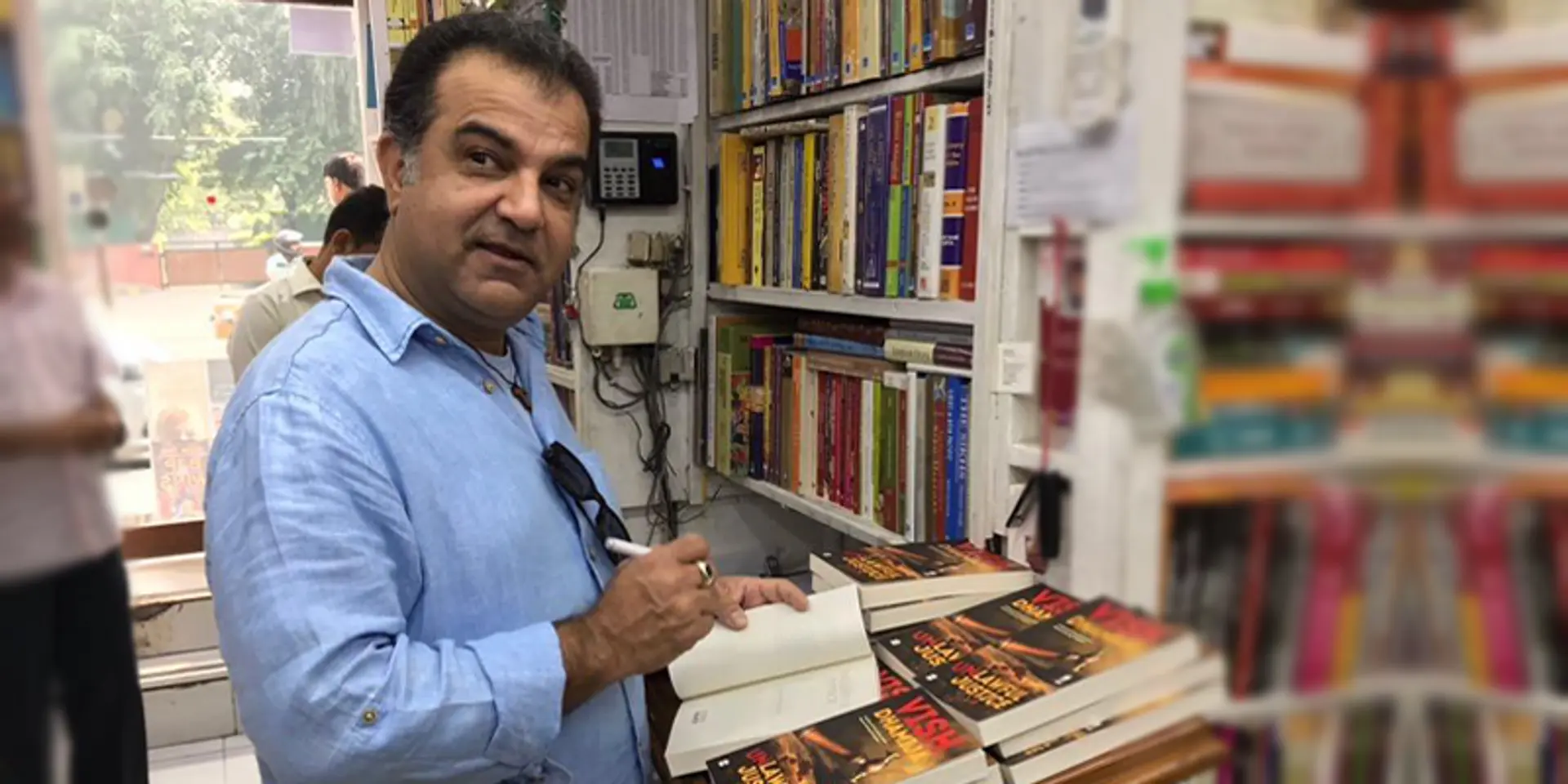'You are only as good as your last book': Vish Dhamija
Meet the British-Indian author, Vish Dhamija, whose books are now being produced as a web series.
Having churned out eight bestselling crime fiction books and as one of the top 51 Indian authors to follow, Vish Dhamija has seen it all. His multi-layered plots and relatable characters continue to captivate Indian readers. One of his book series with its central protagonist Rita Ferreira is soon going to be adapted as a web series by noted producer Vikram Malhotra (who has produced hits like Baby, Airlift, Toilet: Ek Prem Katha). His first book in the series - Bhendi Bazaar - remained on Amazon India’s Top 100 list for ‘Crime, Thriller, and Mystery’ for two years.
Dhamija did his MBA from Manchester Business School, UK. He currently lives there with his wife Nidhi Singh.
We were curious about many things about Vish Dhamija, especially about how he has managed to grasp the psyche of Indian English readers. In an exclusive interview with YS Weekender he speaks about how the Indian reader has evolved, his favourite authors, his latest books and more…
Edited Excerpts from the interview:
YSWeekender: Ever since your first book, what has changed in terms of Indian readers and the market?
Vish Dhamija: My first book (Nothing Lasts Forever) was published in 2010. Honestly, a lot changed in the last nine years — or maybe it’s because my lack of in-depth knowledge of books and the market earlier — but I can see a huge increase in the number of books and authors in the market.
Also, a lot of new publishers have come up, and all of them are doing great work. The other thing that has changed is the advent of the web series, and books being acquired by platforms for adaptation into web series, which provides another canvas for authors to present their work.

Vish Dhamija
YSW: Do you think Indian readers have evolved and how?
VD: Back in the 1980s, we had a handful of Indian authors, so most of the fiction I read, when I was growing up, was by foreign authors. But the landscape has totally changed now. I don’t have any data (to express the split between Indian and foreign authors) but we have a lot of local talent, and the readers and publishers recognise and appreciate that, which is a good sign.
YSW: A major English reading demographic in India still prefers light hearted love stories. What is your opinion about this?
VD: Romance is the best-selling genre across the globe, so in that respect Indian readers are no different. However, mythology is huge in India, which is not present elsewhere.
Another genre that’s read a lot in India is stories about college and campus life. Crime fiction is still in a nascent stage, and a long way from where it is around the world, but it is growing, and that is good news for crime fiction authors like me.
YSW: How has your writing style changed/evolved/remained the same ever since your first book?
VD: Sometimes when I reflect on how I used to think even five years back, I chuckle at my own reasoning and eccentricities at the time; some of them seem juvenile, but that is what, I guess, people call maturity. We — all of us as human beings — evolve, we mature, we become more aware, more judicious.
Also, our priorities change, and so does our language, our cognition and expression. Clearly, it reflects in our writing. Moreover, most authors’ first books contain innocent and naïve storytelling; then, like any other artist, we sharpen our pencils and start working on complex plots and creating intricacies.
Some of my readers tell me that my writing has matured since my first book, although no one has ever told me that I have matured in the last ten years, but that’s another story.
YSW: How important it is for contemporary fiction writers to stick to one genre?
VD: There is no reason to stick to any one genre, and why should anyone? I don’t think there is any rule as such. Writing is an art and hence, every writer should explore different avenues—be it across genres or graphic novels or a change in narrative style.
JK Rowling has written fantasy and crime fiction; Scott Turow writes legal thrillers and non-fiction. So, it’s not something unheard of. I write crime fiction and legal thrillers — and although legal thrillers can be classified as a sub-genre of crime, it requires an altogether different approach. Writers should write what they feel most comfortable writing.
YSW: Who are your favourite authors and how have they influenced your writing?
VD: The German language has lent an excellent word to English: Gestalt—the whole is more than the sum of its parts, isn’t it?
No single author or book has influenced my writing or style but collectively I have to admit that all of them have contributed in some way or the other. If you read other authors it is almost impossible to not get influenced by their work — it might be at a subliminal level, without you even realising it, but it happens.
YSW: Did you always want to be a crime thriller/legal fiction author? If yes/no, why?
VD: Writing was one of the things-to-do in my bucket list and after my first book (in 2010) I thought I had ticked the box, but it succeeded beyond my expectations and so, it prompted me to write more. But yes, since I decided to write, it was always crime/legal fiction, as that’s what I read from the very beginning — even the comics I read were crime fiction in a way — right from Phantom, Mandrake and Tintin, all my childhood heroes were fighting crime.
YSW: How many rejections did you have before you finally made it? What has been your biggest breakthrough as a writer?
VD: More than you can count on your hand. I finished writing my first book in 2008, and it was published in 2010 so it was more than a year of rejections. And there was no breakthrough as such, at least not an everlasting one — like I always tell people, you’re only as good as your last few books. So, if they generate sales, publishers will want to work with you, but if you give a series of flops, you’re out.
YSW: Tell us about your latest book, and how you created it?

Vish Dhamija's latest book, Lipstick
VD: My latest book is Lipstick, and it’s the third in the hugely successful Rita Ferreira series, which has been acquired for adaptation into a multi-season web series.
It’s a dark, gritty, serial killer story narrated in third person but the psychopath/killer — as one critic/reviewer rightly pointed out — sits by your bedside and shares his deepest thoughts in first person. It had been a while since my last Rita Ferreira thriller and that is why I wrote it.
YSW: How do bestselling authors cope up with the pressure of being 'prolific'?
VD: As long as anyone writes what she or he likes to write, it should be simple. The problem starts when an author thinks about writing a bestseller. And what’s a bestseller anyway — it seems “bestseller” has become a synonym for a ‘book’ these days. I’ve seen people claiming that their “next bestseller” will be available soon.
YSW: Do you think every author has a shelf life just like his books?
VD: Like I said earlier, yes. You are only as good as you last few books. For that you need to continuously reinvent your writing to stop your books from becoming repetitious and boring.
YSW: What's your advice to budding Indian fiction writers?
VD: Read, read, and read some more. Read in the genre that you find interesting, learn from successful books and authors, and then write, edit and re-write. Like any other craft, the more you work on it the more you improve. There is no other way to succeed.
YSW: What would be your advice to budding entrepreneurs in the field of book publishing?
VD: One of the key factors of success for publishers is distribution. Books are an impulse buy - if the readers see it displayed in a bookstore, they buy it; if not it's a missed opportunity and all marketing you’ve done will be futile.
YSW: What has been your major failures in life and how did they contribute to your success?
VD: There are no failures or successes in life; nothing is final in any event. One has to take the little accomplishments and disappointments in one’s stride, learn from them and move on. Every experience — good or bad — is like a page in the book of your life and each one of them is equally important in making you a better person, and that reflects in whatever you do, so it’s no different for me as a writer.
Vish Dhamija’s books are available on Amazon and Flipkart and other book stores around India.









